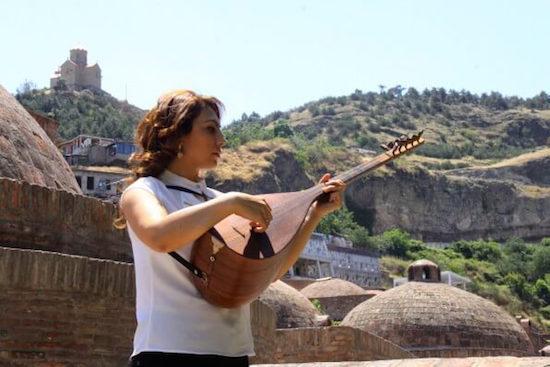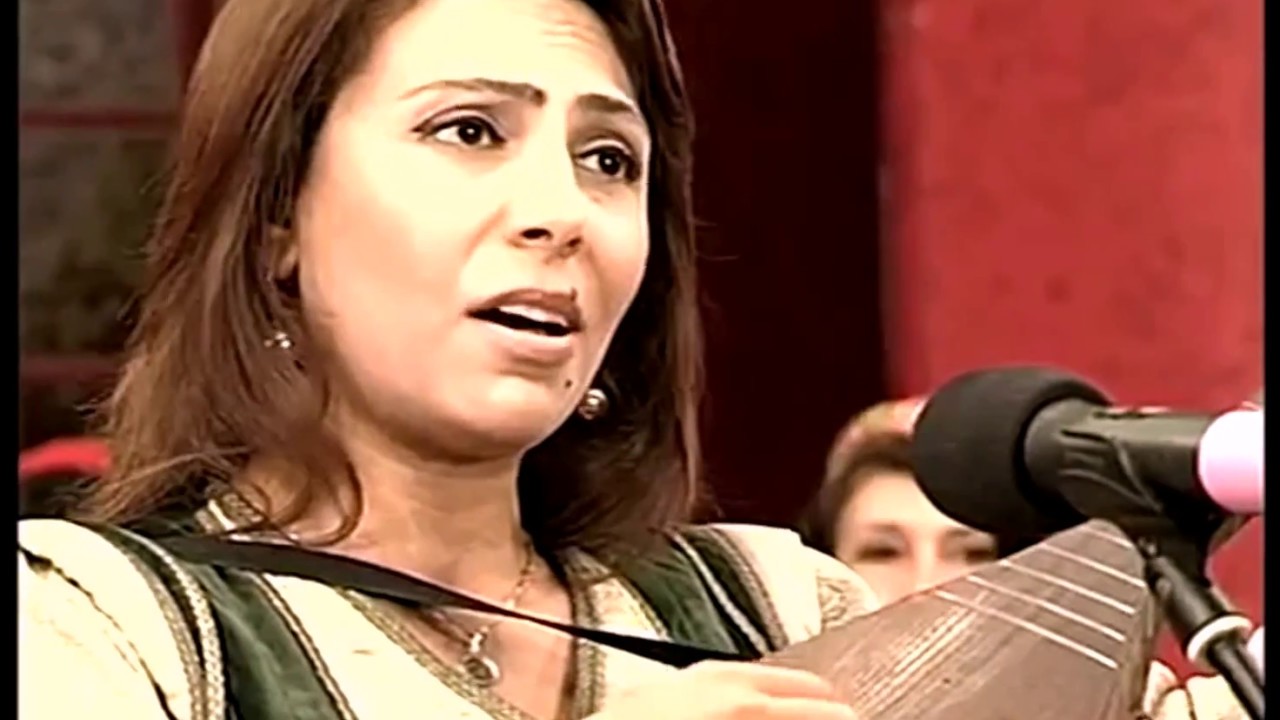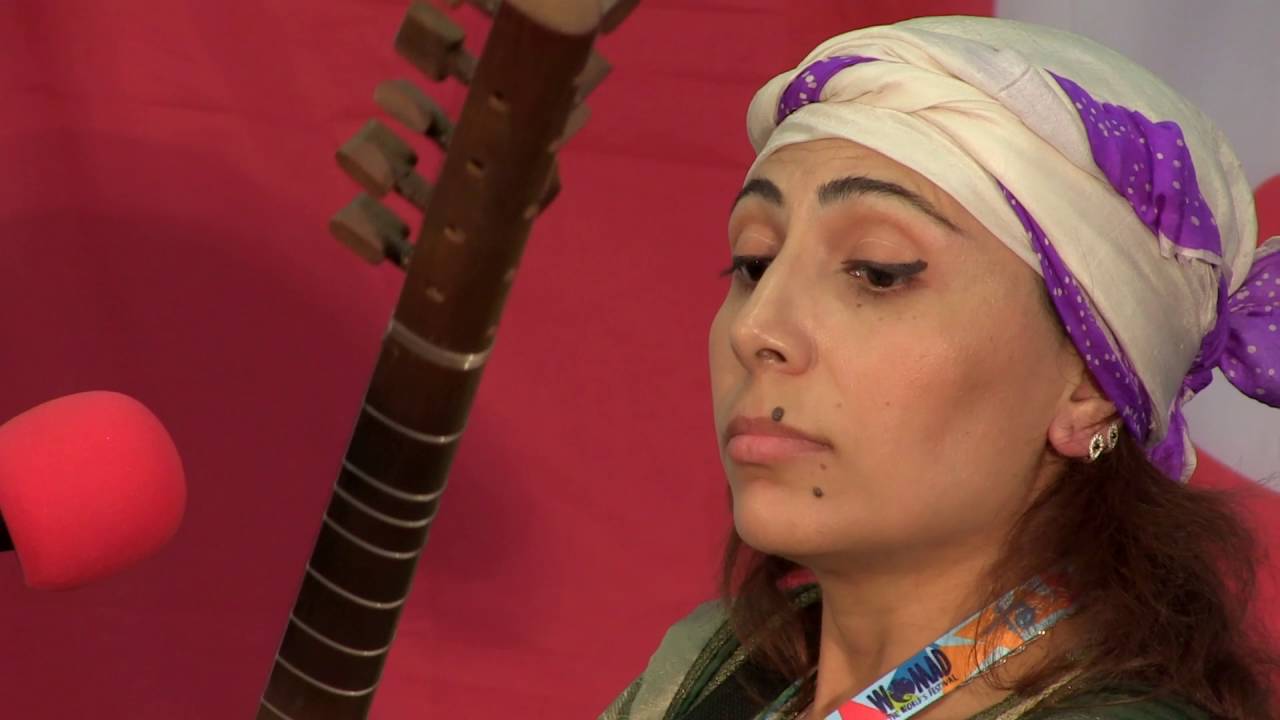The Turkish word Asiq (pronounced ‘ashik’) can mean two things. Firstly, it refers to an ancient tradition of travelling singing bards in Turkic culture, dating back millennia. These bards, referred to with the title ‘Asiq’, would wander lands from Iran to the Caucasus to Turkey, armed with a mighty wooden saz to assist them as they sang vast epic poems, referred to as dastans. The second meaning of ‘asiq’ however, is something close to ‘lovelorn’, or ‘desperately in love’. It’s a description of a state of utter commitment and adoration. This is how one Asiq from Georgia, Nargile, describes her relationship to music.
Pretty much uniquely, Nargile is a female Asiq from the minority group of ethnic Azerbaijanis in Georgia who has also performed across both Azerbaijan and at the Islington Mill in Salford. Practically no folk musician from the Caucasus can match her when it comes to playing in front of Western European audiences. Since 2014, Nargile has played up and down the UK, including performances at London’s Cafe Oto and Newcastle’s Tusk Festival, even sharing the bill several times with touring partner Richard Dawson.
It all began when ethno-musicologist Ben Wheeler and anthropologist Stefan Williamson Fa were living in Georgia’s capital of Tbilisi. This was where they initially setup the Mountains of Tongues project, a non-profit initiative aimed at preserving and promoting the unique musics of the multifaceted Caucasus region (it was for a short while previously known as the ‘Sayat Nova Project’). Asiq Nargile first came to their attention as a saz teacher in the Georgian capital, and after having a few lessons and witnessing her raw abilities and knowledge of the traditional Asiq songbook, Wheeler and Williamson Fa instantly recorded her playing for inclusion in the project. These would later catch the attention of some friends handling concert bookings back in the UK.
The Mountains Of Tongues project has already spawned a couple of compilations, largely comprising field recordings made outside around the Caucuses or intimately in artists’ homes. A full album length recording though, made on Asiq Nargile’s first trip to London, represents the latest phase the catalogue. Issued via Cafe Oto’s in house imprint, Yurt Yeri captures much of the brutal brilliance of Asiq Nargile’s music. The earthen body of the saz can often sit somewhere between drum and string instrument, beating out robust rhythm while Nargile’s fingers run up and down its body at often breathtaking speeds. From song to song, her wild strumming patterns and vocal melodies continually circulate around a series of repeated modes, and Nargile’s voice itself is an often breathtakingly beautiful wash of pure emotion, pushed to rabid and occasionally jarring extremes.
Ahead of her European tour, I spoke to Asiq Nargile via Skype, with translation assistance from Stefan Williamson Fa. The conversation was conducted in Turkish and English.
How did you end up being a musician?
Asiq Nargile: I’m part of is the Asiq tradition, a bardic tradition with very old roots in the Turkic culture. It goes back to ancient times and [features] legendary figures, such as Dede Korkut, seen by many people as the first bard. I grew up listening to and surrounded by this culture, and from a very young age I would listen very carefully to it. My parents and grandparents were very fond of it too, and they saw that I wasn’t like other kids, that I was interested and paid more attention to it. So they said they wanted me to become a bard, an Asiq, and they encouraged me to start learning to play the saz.
I’ll never forget those early days when I started to learn. It’s really hard for a 13 year old child to play this instrument [the saz], because the strings are very tense and rough. As I was playing, my fingers would bleed and blister. I was so determined to continue though, so I would cry and cry, but I’d still continue and push myself. Very few other children would have put up with that. I never forget the pain I went through to master that instrument.
Is the style you play entirely rooted in tradition, or do you add some new or modern elements>
AN: I play the old traditional songs, purely from the Asiq tradition. The words and the melodies are from very established tradition, these are songs I learned from the older generations when I was young. But I do also create my own tunes, and write some of my own lyrics. The main thing I want to be known for though, is for playing the old traditional style. I play some of the new songs occasionally, but when I go on stage in London or Azerbaijan or Turkey, I want to really transmit the Asiq tradition, and stick to it as closely as possible. Nowadays there’s some very popular Asiqs who try and incorporate new things and different instruments, and sing songs in a way that’s not the traditional way to appeal to younger generations. I’m kind of against that… I want to continue the old style.
Is it unusual for a woman to be an Asiq?
AN: Being a female Asiq can be very difficult. Nowadays there are quite a few though. In Azerbaijan and Turkey there are quite a few, but in the community I’m from – the Azeri-Turk minority community in Georgia – I’m the only one. It’s difficult because it just didn’t used to exist. In former times the Asiqs would travel from town to town, from village to village, singing their songs and performing at weddings and ceremonies. Back then, women were told their place was in the home and that they had to stay at home looking after the kids and their husband. If a woman had a good voice or she was talented, she would just have to sing at home.
Recently however, it’s changed. More women are doing it, but they are still expected to play this traditional role at home. So it’s very hard for us to travel. Even so, I’m probably the Asiq that travels most of all nowadays! But I still have to manage my time very carefully, so I can look after my two kids and husband. It’s very difficult doing this job.
What do the other Asiqs think of you?
AN: The other Asiqs treat me quite differently, but have a lot of respect for me. They take me very seriously too. I’m one of the only women seen playing these old songs, and one of the only people singing like that nowadays. People sometimes makes comments, like that I ‘sing like a man’. Despite these difficulties, I have a lot of support and respect from the male Asiqs in the community.
Are these songs all from one region, or do you have to travel and collect them?
The melodies and the old lyrics mostly come from Borchali [the province in southern Georgia with a large Azeri-Turkish population], but some of them come from further away, in Azerbaijan or even the north of Iran. They are quite well known though, to people who like this music. If I hear a poem for the first time I like, in Tbilisi or somewhere, I might put those words to old melodies. So the melodies might be fixed from an old song, while the lyrics come from a contemporary poem.
What is it that drew you to the saz?
AN: I didn’t choose this instrument, it was fate. I didn’t decide to play the saz or become an Asiq – I wanted to be a doctor, but somehow through chance, I became an Asiq. So it’s not something I chose. When I started my teacher said I had a lot of talent, but it would take a lot of work. Everyone has to find their own path, and people who follow the right path are people who succeed. Once you see a path, you have to follow it. If you stick to it, you’ll be successful.
How do people listen to your music during a show? Is this music for dancing or reflection?
AN: Asiq music is not music for dancing. It’s not really about pleasure in that sense. The old Asiqs would got to a village and they’d be storytellers reciting these epic poems called dastans. So it’s about listening carefully to the words and following the story. If somebody is not sitting there listening carefully, they’ll miss the point. The saz is also very important, and also tells the story.
Nowadays at a wedding Asiqs will play more rhythmic stuff so people can dance. They have to do that to survive really, as people don’t have enough time or attention for, for example, four days of dastan storytelling.
You’ve shared the bill with a British musician called Richard Dawson – what did you think of seeing him play?
AN: I first met him at the first concert we shared the bill at. Every time I’d see him perform, he’d create an energy that was very special. The audience would be very relaxed, and he would make them laugh. It was such a good experience to share the stage with him, and he’s a great guy. I enjoyed travelling together with him. There are definitely some similarities too in what we do. Richard doesn’t play dance music or rhythmic music – it’s more about expressing emotions and telling stories. I could feel it without understanding the words. I learned a lot from watching him, and seeing how he created that energy.
Has seeing Richard Dawson without understanding the words helped you to better understand why an audience would enjoy your music without understanding the words?
AN: When I first came to London and got out of the plane and saw where I was, I thought to myself, "What am I doing here? How will the people here understand my music? Am I crazy?" Then when I first went on the stage [at Cafe Oto] I was so nervous I played so quietly. Then I saw how the audience reacted, how people listened so carefully and then applauded after, it gave me a lot more confidence and strength. After visiting [the UK] more, and having played with people like Richard [Dawson], I realise I can really play how I want to play, play these old songs and people will listen. It’s encouraged me to be more different in my approach to performing, and to think of new ideas and ways of performing on stage.
What do you remember about the concert where you recorded Yurt Yeri back in 2014? How do you feel about this album being released?
AN: Now, when I listen to that first concert I feel very critical. I think if I played the same concert today it would be very different. People always say to me, you’ve travelled to so many places, payed all over Azerbaijan and Turkey and abroad in far away places – why are you so critical of yourself? Why can’t you appreciate what you’ve done? Well I always know that I can improve, both my singing and my saz playing.




